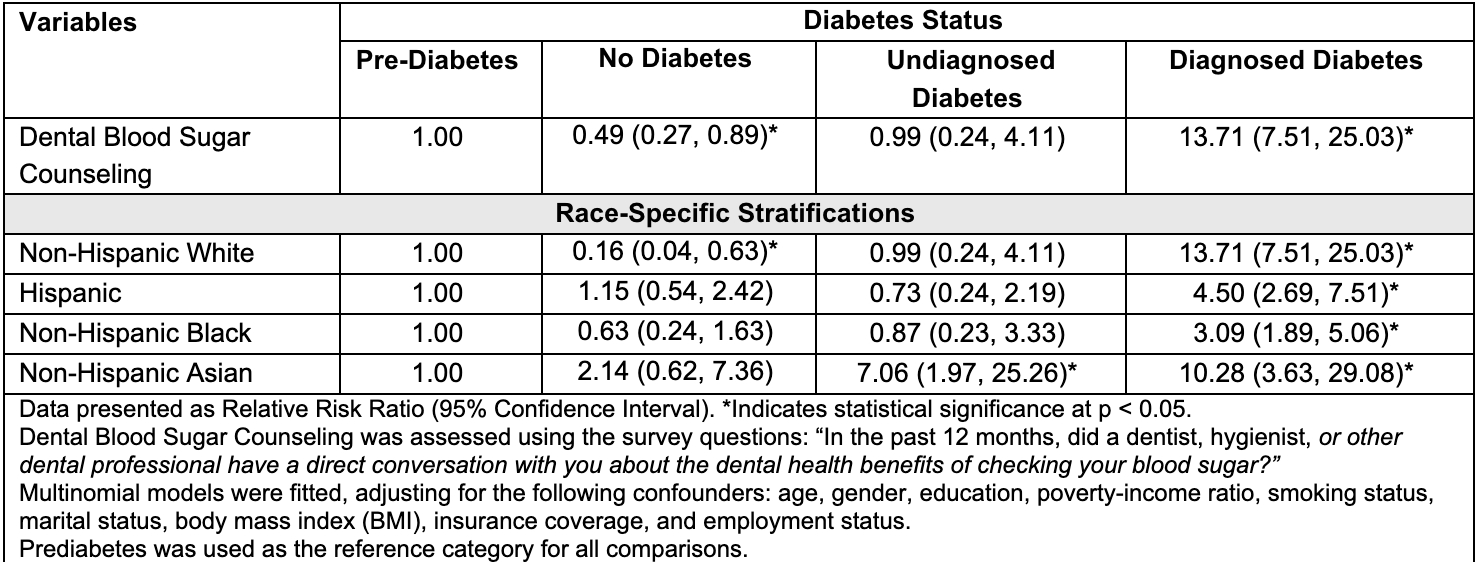Final ID: P1079
Association Between Blood Sugar Counseling at Dental Visits and Diabetes Status: Findings from the 2011-2020 National Health and Nutrition Examination Survey
Abstract Body: Almost 10 million adults across the United States are unaware that they have diabetes. Despite the strong link between diabetes and adverse oral health outcomes, blood sugar screening is not routine procedure in dental offices.
To examine the association between receiving blood glucose counseling from dentist.
Cross-sectional data from the 2011-2020 National Health and Nutrition Examination Survey assessed the relationship between blood sugar screening advice by dentists, and diabetes status. The primary exposure was defined as whether individuals were advised by their dentist to check their blood sugar, assessed with the survey question: “In the past 12 months, did a dentist, hygienist, or other dental professional have a direct conversation with you about the dental health benefits of checking your blood sugar?” The outcome variable was categorized into four levels of diabetes status: no diabetes, prediabetes, undiagnosed diabetes, and diagnosed diabetes. We fitted weighted multinomial logistic regression models; first conducting an overall analysis, then performing race-specific analyses to examine how the association between dental blood sugar counseling and diabetes status varied across four racial/ethnic groups.
The sample included 14,057 U.S. adults, mean age 53 (±16) years; 52% were female. With prediabetes as the reference group, those with no diabetes had a lower relative risk of receiving blood glucose counseling from dentists (RRR:0.49, 95% CI:0.27, 0.89), while those with diagnosed diabetes were more likely to receive this counseling (RRR:13.71, 95% CI:7.51, 25.03). Race-specific analyses showed variations in this association. For diagnosed diabetes, non-Hispanic White adults showed the strongest association (RRR:13.71, 95% CI:7.51, 25.03), followed by non-Hispanic Asian adults (RRR:10.28, 95% CI: 3.63, 29.08), Hispanic adults (RRR:4.50, 95% CI:2.69, 7.51), and non-Hispanic Black adults (RRR:3.09, 95% CI:1.89, 5.06). Notably, among non-Hispanic Asian adults, undiagnosed diabetes was also strongly associated with counseling (RRR:7.06, 95% CI:1.97, 25.26).
Receiving blood glucose counseling during dental visits showed strong associations with diagnosed diabetes, suggesting dentists’ potential to contribute significantly to diabetes management. The varying strengths of this association across racial and ethnic groups may be opportunities for targeted interventions, such as integrating blood sugar screening and counseling into routine dental care.
To examine the association between receiving blood glucose counseling from dentist.
Cross-sectional data from the 2011-2020 National Health and Nutrition Examination Survey assessed the relationship between blood sugar screening advice by dentists, and diabetes status. The primary exposure was defined as whether individuals were advised by their dentist to check their blood sugar, assessed with the survey question: “In the past 12 months, did a dentist, hygienist, or other dental professional have a direct conversation with you about the dental health benefits of checking your blood sugar?” The outcome variable was categorized into four levels of diabetes status: no diabetes, prediabetes, undiagnosed diabetes, and diagnosed diabetes. We fitted weighted multinomial logistic regression models; first conducting an overall analysis, then performing race-specific analyses to examine how the association between dental blood sugar counseling and diabetes status varied across four racial/ethnic groups.
The sample included 14,057 U.S. adults, mean age 53 (±16) years; 52% were female. With prediabetes as the reference group, those with no diabetes had a lower relative risk of receiving blood glucose counseling from dentists (RRR:0.49, 95% CI:0.27, 0.89), while those with diagnosed diabetes were more likely to receive this counseling (RRR:13.71, 95% CI:7.51, 25.03). Race-specific analyses showed variations in this association. For diagnosed diabetes, non-Hispanic White adults showed the strongest association (RRR:13.71, 95% CI:7.51, 25.03), followed by non-Hispanic Asian adults (RRR:10.28, 95% CI: 3.63, 29.08), Hispanic adults (RRR:4.50, 95% CI:2.69, 7.51), and non-Hispanic Black adults (RRR:3.09, 95% CI:1.89, 5.06). Notably, among non-Hispanic Asian adults, undiagnosed diabetes was also strongly associated with counseling (RRR:7.06, 95% CI:1.97, 25.26).
Receiving blood glucose counseling during dental visits showed strong associations with diagnosed diabetes, suggesting dentists’ potential to contribute significantly to diabetes management. The varying strengths of this association across racial and ethnic groups may be opportunities for targeted interventions, such as integrating blood sugar screening and counseling into routine dental care.
More abstracts on this topic:
Assessing Knowledge, Attitudes, and Practices Regarding the American Heart Association’s Framework for Cardiovascular Health in Pediatrics
Ortiz Robin, Chan Debra, Nita Abigail, Heffron Sean, Nagpal Nikita, Duh-leong Carol
A Comparative Study Of Social Determinants, Hypertension, And Life Essential Factors In Alabama And Colorado From The 2021 Behavioral Risk Factor Surveillance SystemChukwunyere Chibuike, Owuor Kevin

